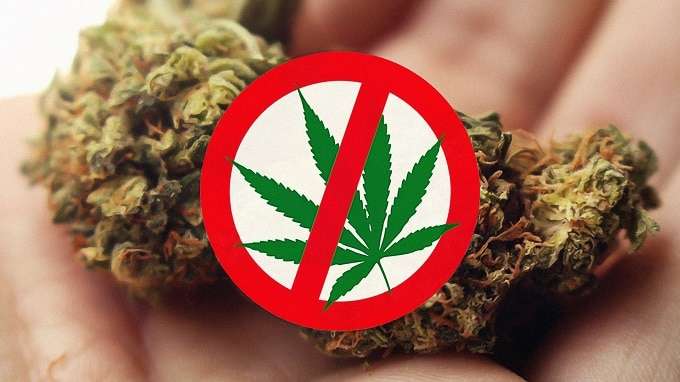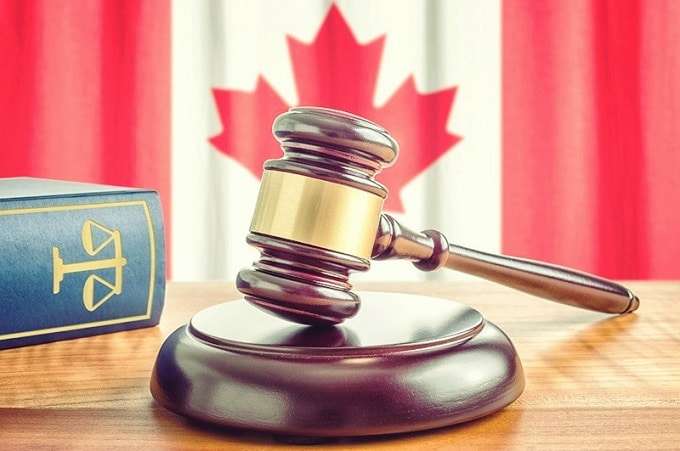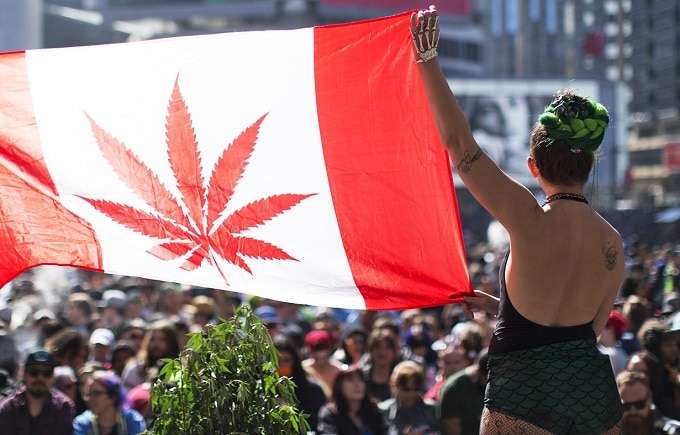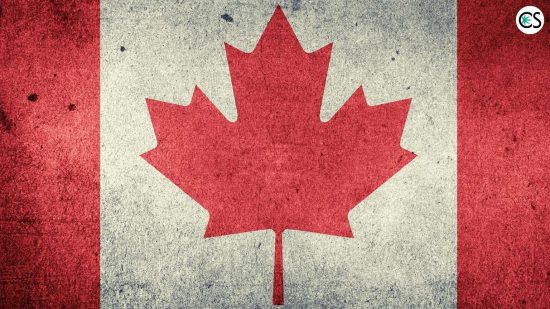People across Canada are celebrating one of the most iconic days in cannabis history, as recreational marijuana is now legal throughout the country.
Sales began early Wednesday, October 17 in Newfoundland. It’s safe to say that Canada will never be the same again.
Canadians Rejoice Over Their Newfound Freedom
Cannabis consumers throughout Canada couldn’t be happier.
Take Ian Power, for example, who was one of the first in line at the Tweed store in St. John’s, Newfoundland, with high hopes to be the first person to ever purchase legal pot in the country.
While Power might not have been the first, he certainly was one of them. He doesn’t, however, have any plans to smoke the pot he purchased.
“I am going to frame it and hang it on my wall. I’m not even going to smoke it,” said Power. “I’m just going to save it forever.”
Then there’s Tom Clarke, who was an illegal pot dealer for decades.
He was one of the first to make a legal sale when his (legal) pot shop opened at midnight in Portugal Cove, Newfoundland.
His first sale was to his father. He then attended to the 50-100 other folks who were waiting in line outside his shop.
Clarke’s middle name is Herb, and he’s been called THC by his friends for years.
For some, going from a former drug dealer to legal cannabis businessman is what dreams are made of.
“This is awesome,” says Clarke. “I’ve been waiting my whole life for this.
I am so happy to be living in Canada right now instead of south of the border.”
His father, Don, feels the same.
“It’s been a long time coming,” says Don Clarke. “We’ve only been discussing this for 50 years. It’s better late than never.”
The legalization of cannabis in Canada just made America’s northern neighbor the largest country with a nationally legal marijuana market.
But as we all well know, like most other parts of the world, this wasn’t always the case.
Why Weed Became Illegal in Canada in the First Place

Before 1923 when cannabis was deemed illegal in Canada, there were very few Canadian citizens that had even heard of the substance.
And no one was really consuming it. So why was this virtually unknown substance ever banned in the first place?
In Canada in the early 1920s, there was a bit of a panic over drug use in the country.
Women’s rights activist of that time, Emily Murphy, is suspected to have something to do with the increased fear.
She wrote a series of articles in 1920 warning that drug-muddled young women would have no choice but to give into the sexual demands of Chinese men, which would in turn lead to the birth of “mixed-race” babies.
In 1922, Murphy published a book called The Black Candle that insisted that marijuana users “become raving maniacs” and “are liable to kill or indulge in any sort of violence.”
While her book didn’t receive much attention, the articles penned by Murphy aided in giving rise to an anti-drug campaign in Vancouver that went on for months.
This led the Canadian government to pass laws that increased minimum penalties for drug possession to a six-month sentence.
Around the same time, almost all Chinese immigration to Canada was halted by the government.
It didn’t have anything to do with weed per say but was rather aimed at Chinese who used opium and smuggled the substance into the country.
Here’s the thing, though. Rather than adding opium to the schedule of restricted drugs, Parliament added cannabis instead.
There was no debate in Congress and no mention of the decision in the media.
Today, the inclusion of cannabis and not opium remains a mystery.
This was in 1923. And while the assistant chief of Canada’s Narcotic Division, KC Hossik wrote in 1929 that Canada had to include cannabis on the list of restricted substances because the 1925 Geneva Convention limited cannabis to “medical and scientific” use and was under international control.
The convention, however, was two years after Canada banned cannabis.
So what gives?

Some 50 years later in 1974, assistant deputy minister of the health protection branch at Health and Welfare Canada, Alexander B. Morrison, wrote: “It appears that Col. Sharman (chief of the narcotic division) returned from meetings of the League of Nations convinced that cannabis would soon fall under international control.
In anticipation….he moved to have it added to the list of drugs controlled under Canadian law.”
The thing is, there weren’t even any cannabis convictions until 15 years after the substance was banned.
Even then, they were far and few between. In the mid-1950s, a study of convicted drug criminals in Canada found that only a very small number of them had actually even tried weed.
It wasn’t until the 60s that cannabis became popular in Canada as today’s Baby Boomers began to come of age and experiment with all kinds of substances.
Long, harsh sentences were handed out like candy for simple possession of marijuana, and those who were convicted became understandably outraged.
So began the journey to cannabis legalization in Canada. And while it’s some 50 years later, that day is finally here.
Now That Weed’s Legal in Cannabis, What Exactly are the Laws?
Recreational weed just became the newest Canadian commodity.
This newfound freedom isn’t without the laws that govern it, though.
Here’s the lowdown on Canada’s new weed laws that recently went into effect.
Canadian adults are now permitted to legally purchase, possess, carry, and share (with other adults) up to 30 grams of dried cannabis flower, which is just over one-ounce.
In most provinces, Canadians will also be able to grow their own and are permitted a maximum of four plants per household.
For the most part the minimum age to buy and possess cannabis in Canada is 18.
Some provinces, however, have raised the age to 19. And in Quebec, only those 21 and over will be legally allowed to purchase pot.
How exactly people will purchase legal pot will also fluctuate from province to province.
In British Columbia, that has a population of 4.6 million people, there is only one pot shop.
In Nova Scotia, that has a population of 940,000, there are 12 stores.
In Ontario, with a population of over 12 million people, weed is only available right now online.
Just hours before pot shops in Canada opened for business, a Canadian government official announced to the Associated Press that Canada will pardon all citizens with former cannabis possession charges of up to 30 grams.
Anyone who wants a pardon on former pot possession charges will need to apply for it.
For the most current information about the laws in your exact area, check with your local authorities and administrative resources.
Some Believe Hasty Regulations Won’t Come Without Consequence
Abby Deshman works for the Canadian Civil Liberties Association and says that the regulations that were rushed into place that oversee the legal market could come with some unintended results.
“We’re legalizing the industry,” said Deshman, “but criminalizing a lot of the aspects around the use of cannabis.
The danger in this is that people are going to go out and think that they’re using a legal substance and will use it in a variety of ways that seem innocuous but could result in criminal charges.”
In a nation of 37 million people on a landmass that spans 3.855 million square miles, there will only be roughly 110 shops that can legally sell weed.
While one of the goals of legalizing marijuana nationwide has been to bring illicit cannabis operatives into a regulated system, if people don’t have access to weed in a store, they’re not going to stop buying it on the black market.
While many more legal pot shops are scheduled to open, it will take some time.
And until everyone who wants access to pot can buy it legally in a shop, the illicit operatives legalization intended to cut out are likely to continue to thrive.
Criminal penalties relating to cannabis will still be upheld post legalization.
People selling cannabis on the black market in Canada could still be hit with heavy fines and can end up in jail for 14 years.
Giving or selling cannabis to someone under 18 (like the now-legal 18-year-old who wants to get high with his 17-year-old buddy) can also land you in jail for up to 14 years.
In Nova Scotia, anyone other than the Nova Scotia Liquor Board caught selling cannabis could face up to a $10,000 fine.
Anyone in Nova Scotia who is caught purchasing cannabis from anyone else aside from the NSLC could be fined up to $250.
Anyone under 18 that’s caught with cannabis could be looking at a $150 fine.
In Ontario, businesses that sell weed illegally could face fines up to $250,000 and/or jail time of up to 2 years less one day.
For every day, any business or individual who is caught selling pot after they were caught the first time, they can be fined up to $100,000 and $500,000 correspondingly.
Laws pertaining to driving with pot differ to varying degrees across Canada.

If you’re in Manitoba, law requires you keep your marijuana in the trunk.
If you’re in the northern territory of Nunavut, feel free to carry it openly as long as no one in the vehicle can reach it.
In Prince Edward Island, it can also be kept in open packaging but cannot be accessed by the driver or passengers in the vehicle.
As far as consumption itself is concerned, people in Ontario can openly smoke or vape their weed in public wherever cigarette smoking is permitted.
Not quite the case in Saskatchewan, where people caught smoking pot in public can be fined up to $200.
In Manitoba, public consumption fines are $672. As we said earlier, it’s important you know the laws of your local area.
That way you can keep yourself within the boundaries of the law if you decide to use cannabis in Canada.
While they’ve obviously got a few kinks to work out, Canada did just become one of the world’s first countries to federally legalize weed.
Perhaps the US government should take some notes?
Canada just started up one of the greatest social experiments of our time. There’s going to be a lot to learn.
What Legal Cannabis in Canada Means for Both Canadians and Americans
While many might assume that with cannabis legal in Canada, the US is close behind.
However, in the US, recreational marijuana is legal in twelve states, and Washington DC and medical marijuana is legal in 30 states, weed still remains illegal at the federal level.
Despite its federal illegality, public opinion of cannabis in the US has shifted dramatically.
According to the Pew Research Center, in 1969 only 12 percent of Americans polled believed weed should be legalized.
In 2017, 61 percent of Americans supported the idea of marijuana legalization.
A 2018 Pew Research Poll published in early October shows the number of Americans that support legalization has risen to 62 percent.
It also found that 69 percent of Democrats think weed should be legalized.
And while only 45 percent of Republicans are on board with legal weed, this number is up from 39 percent in 2015.
Canada and the US are kind of like cousins, and many contend that in the natural order of things America will be next.
According to Oregon Rep. Earl Blummer, who is a member of the recreational marijuana is legal in nine states and Washington DC and medical marijuana is legal in 30 states, a Congress group intent on changing the way the US federal government treats weed, “There are those who sometimes regard Canada as the 51st state.”
He says that legalization in Canada “is an important signal about the movement coming of age.”
There’s also the border issue.
Now that weed is legal in Canada, US citizens are free to cross over to the other side and light up with their Canadian neighbors.
For Canadians that want to cross the border and light up in the US, however, it’s a different story.
Anyone from Canada who admits to smoking weed when crossing into the US faces the possibility of being banned from the country for life.
Weed in the US is federally illegal, after all. And the US border is very much run under federal regulation.
Will the US follow in the footsteps of its neighbor to the North? Only time will tell.
Legal Weed in Canada: A Sign of Changing Times

Despite some of the setbacks that are sure to occur with nationwide legalization in Canada, the very fact that weed is legal in the country is something to celebrate and rejoice over.
It’s a sign of changing times as old, outdated structures begin to crumble before our eyes.
What does the future look like for cannabis, both recreational and medicinal?
Let’s just say that we’ve come a long way, but there’s still a long way to go.
Is the grass really greener on the other side? Since Canada now legalized weed, it sure seems to be the case at this point








